Text
Paradise Lost: How John Milton's 1667 work influenced "Hazbin Hotel"
I've been thinking about why the "fruit of knowledge" in Hazbin Hotel is depicted as an apple, as opposed to another fruit that would've been more accurate to the Middle East during the Fall of Man, as well as how Paradise Lost by John Milton (1667) influenced the show.
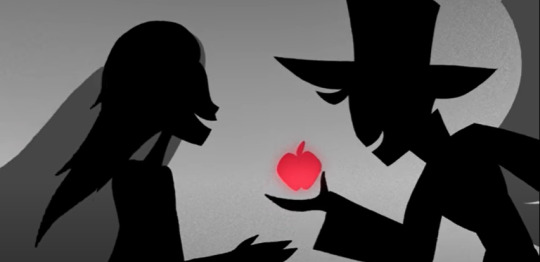
Per one source:
"Because the Hebrew Bible describes the forbidden fruit only as 'peri', the term for general fruit, no one knows [what exactly type of fruit it was]. It could be a fruit that doesn't exist anymore. Historians have speculated it may have been any one of these fruits: pomegranate, mango, fig, grapes, etrog or citron, carob, pear, quince, or mushroom."
Per Wikipedia:
"The pseudepigraphic Book of Enoch describes the tree of knowledge: 'It was like a species of the Tamarind tree, bearing fruit which resembled grapes extremely fine; and its fragrance extended to a considerable distance. I exclaimed, How beautiful is this tree, and how delightful is its appearance!' (1 Enoch 31:4)."
In Jewish and Islamic traditions, the "fruit of knowledge" is commonly identified with grapes. The Zohar explains that Noah attempted (but failed) to rectify the sin of Adam by using grape wine for holy purposes. Today, the "Noah grape" is still used to make white wine.

Furthermore:
"The association of the pomegranate with knowledge of the underworld as provided in the Ancient Greek legend of Hades and Persephone may also have given rise to an association with knowledge of the 'otherworld', tying-in with knowledge that is forbidden to mortals. It is also believed Hades offered Persephone a pomegranate to force her to stay with him in the underworld for 6 months of the year. Hades is the Greek god of the underworld, and the Bible states that whoever eats the forbidden fruit shall die."
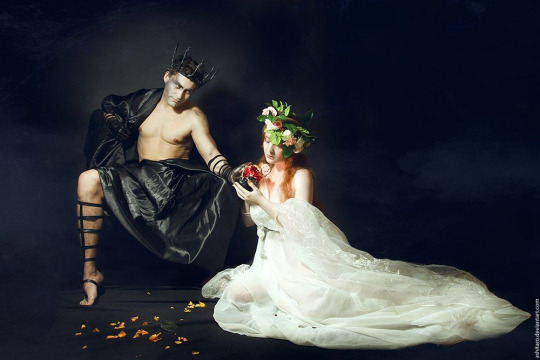
So, how then did the apple become the foremost symbol of the "fruit of knowledge"? You can partly thank Paradise Lost by English poet John Milton, a work which the lore of Hazbin Hotel is based off of.
Milton published the book in 1667, a time when the hedonistic Restoration era was in full swing. The exiled King Charles II was restored to the throne as King of England in 1660, and was a party animal, with dozens of mistresses, and nicknamed both the "playboy prince" and "Old Rowley", the latter after his favorite lustful stallion.
However, the association of the "fruit of knowledge" began with a Latin pun long before Milton immortalized the association in Paradise Lost. Per the linked article above by Nina Martyris for NPR:
"In order to explain, we have to go all the way back to the fourth century A.D., when Pope Damasus ordered his leading scholar of scripture, Jerome, to translate the Hebrew Bible into Latin. Jerome's path-breaking, 15-year project, which resulted in the canonical 'Vulgate', used the Latin spoken by the common man. As it turned out, the Latin words for evil and apple are the same: 'malus'.
[...] When Jerome was translating the 'Tree of the Knowledge of Good and Evil', the word 'malus' snaked in. A brilliant but controversial theologian, Jerome was known for his hot temper, but he obviously also had a rather cool sense of humor.
'Jerome had several options,' says Robert Appelbaum, a professor of English literature at Sweden's Uppsala University. 'But he hit upon the idea of translating 'peri' as 'malus', which in Latin has two very different meanings. As an adjective, 'malus' means 'bad' or 'evil'. As a noun it seems to mean an apple, in our own sense of the word, coming from the very common tree now known officially as the 'Malus pumila'. So Jerome came up with a very good pun.'
The story doesn't end there. 'To complicate things even more,' says Appelbaum, 'the word 'malus' in Jerome's time, and for a long time after, could refer to any fleshy seed-bearing fruit. A pear was a kind of 'malus'. So was the fig, the peach, and so forth.'
Which explains why Michelangelo's Sistine Chapel fresco features a serpent coiled around a fig tree. But the apple began to dominate Fall artworks in Europe after the German artist Albrecht Dürer's famous 1504 engraving depicted the First Couple counterpoised beside an apple tree. It became a template for future artists such as Lucas Cranach the Elder, whose luminous Adam and Eve painting is hung with apples that glow like rubies.
Milton, then, was only following cultural tradition. But he was a renowned Cambridge intellectual fluent in Latin, Greek and Hebrew, who served as secretary for foreign tongues to Oliver Cromwell during the Commonwealth. If anyone was aware of the malus pun, it would be him, and yet he chose to run it with it. Why?
Appelbaum says that Milton's use of the term 'apple' was ambiguous. 'Even in Milton's time the word had two meanings: either what was our common apple, or, again, any fleshy seed-bearing fruit. Milton probably had in mind an ambiguously named object with a variety of connotations as well as denotations, most but not all of them associating the idea of the apple with a kind of innocence, though also with a kind of intoxication, since hard apple cider was a common English drink.'
It was only later readers of Milton, says Appelbaum, who thought of 'apple' as 'apple', and not any seed-bearing fruit. For them, the forbidden fruit became synonymous with the 'malus pumila'. As a widely read canonical work, 'Paradise Lost' was influential in cementing the role of apple in the Fall of Man story."
To tie this back into John Milton's relationship with King Charles II of England, as mentioned, Milton originally served Oliver Cromwell, Lord Protector of England, and the English Commonwealth, which was formed with the overthrow and execution of King Charles I on 30 January 1649, following the bloody English Civil War (1642 – 1651).
The King's two sons - the newly-christened King Charles II, the elder, and James, Duke of York (King James II), the younger - fled into exile on the European continent. However, with the death of Oliver Cromwell on 3 September 1658 came the 2-year-long dissolution of the English Commonwealth, and the restoration of the monarchy.
As for Milton himself, we can look to an article by Bill Potter.
Milton, born on 9 December 1608, was around 51-52 years old when King Charles II was restored to the throne. He attended Christ's Church, Cambridge in his youth, and mastered at least six languages, as well as history and philosophy; making him, perhaps, the most knowledgeable poet in history. He spent more than a year travelling across Europe, conversing with and learning from intellectuals, linguists, poets, and artists, including the famous Galileo Galilei.
However, Milton was a controversial figure of his time, being unafraid to criticize institutions of authority; arguing that "divorce was Biblical", for which he was routinely condemned; joining the Puritans; penning the Areopagitica, a treatise on liberty in favor of Parliament and the Roundhead rebels, during the reign of King Charles I, arguing that the King must be held accountable by the people; and agreed with and justified the murder of King Charles I, for which Parliament hired him in 1649 as a propagandist and correspondence secretary to foreign powers, on account of his fiery manifestos against "the man".
The collapse of the Commonwealth with the death of Oliver Cromwell in 1658 did not deter Milton from continued political writing against the monarchy and the new public sentiment that brought about its Restoration under King Charles II in 1660. On the contrary, Milton - now totally blind, having lost his eyesight by the age of 44 in 1652, a decade earlier - began writing Paradise Lost in 1661, and spend the next six years dictating the work to transcribers.
A supporter of regicide, Milton was also forced into exile himself, and faked his own death, as Charles refused to pardon - and sought to execute - any of those directly involved with his father's murder. Milton's friends held a mock funeral for Milton on 27 August 1660, just months after the coronation of King Charles II on 23 April 1660.
King Charles II commented that he "applauded his [Milton's] policy in escaping the punishment of death [execution for treason] by a reasonable show of dying", but insisted on a public spectacle nonetheless by having Milton's writings burned by the public hangman.
After eventually obtaining a general pardon from King Charles II, Milton was imprisoned, and released, likely due to political friends in high places. He died, aged 64, in 1674. His theological views were sometimes considered heterodox by the best Puritans, and his political views came close to getting him executed on several occasions. His poetry, however, has endured as some of the greatest works in the English language, especially Paradise Lost; much of his greatest work was written during his 22 years of complete blindness.
One of the main factors in King Charles II deciding to grant a pardon to Milton was, ironically, Paradise Lost. While originally written by Milton as a scathing criticism of King Charles II and the monarchy - depicting Lucifer Morningstar as a sympathetic rebel against God, with King Charles II claiming that is right to rule came from "divine ordainment" - Charles II enjoyed the work, and authorized its publication on 20 August 1667. We know this because a 1668 copy of Paradise Lost in royal bindings by Samuel Mearne, bound lovingly in a fine red leather made of goat skins tanned with sumac, and stamped in gold with the royal cypher of King Charles II, was found. The endpapers bore a watermark with the royal arms of Charles II.
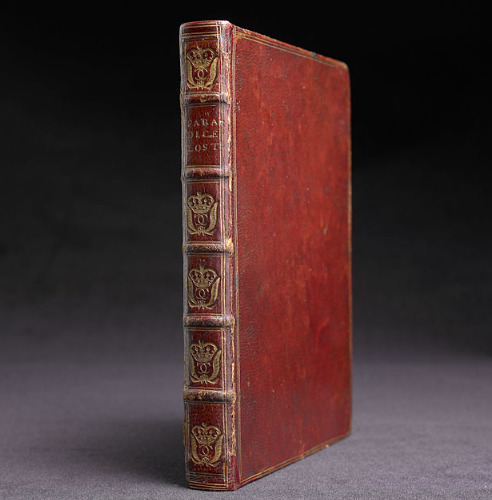
Per one Miltonian scholar: "The most single important event in Milton's life was the event against which he struggled most: the Restoration of Charles II, [and his relationship with the King]. Had it not come, we might have never had Paradise Lost...certainly, we should never have had [it] in [its] present power and significance."
Milton followed up Paradise Lost with Paradise Regained in 1671, three years before his death, with advice for King Charles II, urging the hedonistic Charles to "reign over himself and his passions":
"For therein stands the office of a King, His Honour, Vertue, Merit and chief Praise, That for the Publick all this weight he bears. Yet he who reigns within himself, and rules Passions, Desires, and Fears, is more a King; Which every wise and vertuous man attains: And who attains not, ill aspires to rule Cities of men, or head-strong Multitudes, Subject himself to Anarchy within, Or lawless passions in him which he serves." - John Milton, Paradise Regained, Book II, lines 463-472
To summarize: "If we must have a King back again, my Lord, please try to be a good man, unlike your father, who fell to his pride, [which was also the downfall of Lucifer]."
To quote another source: "Though the passage begins by noting that the office of a King is to bear the weight of public concerns, it is the control of one's private concerns that truly set a King apart as a virtuous character. Indeed, so important is self-command that any wise or virtuous man who attains it is like a king; any king who does not practice [self-command] is nothing more than a mere subject, ruled by anarchy and lawlessness."
Milton's words, too, echo a work written by Charles' grandfather, King James VI/I of Scotland and England: Basilikon Doron ("Royal Gift").
Per Wikipedia:
"'Basilikon Doron' (Βασιλικὸν Δῶρον) means 'royal gift' in Ancient Greek, and was written in the form of a private letter to James' eldest son, Henry, Duke of Rothesay (1594–1612). After Henry's death, James gave it to his second son, Charles, born 1600, later King Charles I. Seven copies were printed in Edinburgh in 1599, and it was republished in London in 1603, when it sold in the thousands.
This document is separated into three books, serving as general guidelines to follow to be an efficient monarch. The first describes a king's duty towards God as a Christian. The second focuses on the roles and responsibilities in office. The third concerns proper behaviour in daily life.
As the first part is concerned with being a good Christian, James instructed his son to love and respect God as well as to fear Him. Furthermore, it is essential to carefully study the Scripture (the Bible) and especially specific books in both the Old and New Testaments. Lastly, he must pray often and always be thankful for what God has given him.
In the second book, James encouraged his son to be a good king, as opposed to a tyrant, by establishing and executing laws as well as governing with justice and equality, such as by boosting the economy. The final portion of the Basilikon Doron focuses on the daily life of a monarch.
All of these guidelines composed an underlying code of conduct to be followed by all monarchs and heads of state to rule and govern efficiently. James assembled these directions as a result of his own experience and upbringing. He, therefore, offered the 'Basilikon Doron' ('Royal Gift') to his son, with the hope of rendering him a capable ruler, and perhaps to pass it down to future generations.
Overall, it repeats the argument for the divine right of kings, as set out in 'The True Law of Free Monarchies', which was also written by James. It warns against 'Papists' (Roman Catholics) and derides Puritans, in keeping with his philosophy of following a 'middle path', which is also reflected in the preface to the 1611 King James Bible. It also advocates removing the Apocrypha from the Bible."
King James VI/I further instructed his son and grandson:
"A good monarch must be well acquainted with his subjects, and so it would be wise to visit each of the kingdoms every three years."
"During war or armed conflict, he should choose old-but-good captains to lead an army of young and agile soldiers."
"In the court and the household, [a royal] should carefully select loyal gentlemen and servants to surround him. When the time came to choose a wife, it would be best if she were of the same religion and had a generous estate. However, she must not meddle with governmental politics but perform her domestic duties."
"As for inheritance, to ensure stability, the kingdom should be left to the eldest son, not divided among all children."
"Lastly, it is most important...that [a royal] would know well his own craft...to properly govern over his subjects. To do so, [one] must study the laws of the kingdom, and actively participate in the council. Furthermore, [one] must be acquainted with mathematics for military purposes, and world history for foreign policy."
"[A royal] must also not drink and sleep excessively. His wardrobe should always be clean and proper, and he must never let his hair and nails grow long. In his writing and speech, he should use honest and plain language."
King James VI/I further supplemented Basilikon Doron with a written treatise titled The True Law of Free Monarchies: Or, The Reciprocal and Mutual Duty Between a Free King and His Natural Subjects.
"It is believed King James VI/I wrote the tract to set forth his idea of absolutist monarchism in clear contrast to the contractarian views espoused by, among others, James' tutor George Buchanan (in 'De Jure Regni apud Scotos'), [which] held the idea that monarchs rule in accordance of some sort of social contract with their people. James saw the divine right of kings as an extension of the apostolic succession, as both not being subjected by humanly laws."
Milton's own Areopagitica was a follow-up on De Jure Regni apid Scotos by George Buchanan, and also to The True Law of Free Monarchies, as well as the idea of the "divine right of kings". It takes its title in part from Areopagitikos (Greek: Ἀρεοπαγιτικός), a speech written by Athenian orator Isocrates in the 4th century BC.
Most importantly, Milton also wrote on the concept of free will: "Milton's ideas were ahead of his time in the sense that he anticipated the arguments of later advocates of freedom of the press by relating the concept of free will, and choice to individual expression and right."
The concept of free will, too, was a major topic explored in Paradise Lost. Per one source: "In 'Paradise Lost', Milton argues that though God foresaw the Fall of Man, he still didn't influence Adam and Eve's free will. [...] God specifically says that he gives his creatures the option to serve or disobey, as he wants obedience that is freely given [or chosen], not forced. Some critics have claimed that the God of the poem undercuts his own arguments; however, Milton did not believe in the Calvinistic idea of 'predestination' (that God has already decided who is going to Hell and who to Heaven), but he often comes close to describing a Calvinistic God. God purposefully lets Lucifer (Satan) escape Hell, and sneak past Uriel into the Garden of Eden, and basically orchestrates the whole situation so that humanity can be easily ruined by a single disobedient act. In describing the Fall of Man before it happens, God already predicts how he will remedy it, and give greater glory to himself by sending his Son [Jesus Christ] to die, and restore the order of Heaven."
In Hazbin Hotel, Adam also describes the Calvinistic idea of 'predestination', and that "the rules are black and white":

However, "This possible predestination leads to the theory of the 'fortunate fall', which is based on Adam's delight at learning of the eventual coming of the Messiah [from his bloodline]. This idea says that God allowed the Fall of Man, so that he could bring good out of it, possibly more good than would have occurred without the Fall, and be able to show his love and power through the incarnation of his Son. In this way, the free will of Adam and Eve (and Lucifer/Satan) remains basically free, but still fits into God's overarching plan."
However, there is one major flaw with this, and that is that we don't know if Jesus Christ exists within the Hazbin Hotel universe or not. Yet Charlie Morningstar, the daughter of Lucifer Morningstar and Lilith, and the "Princess of Hell", is depicted as a savior-esque figure within the show who, like God in Paradise Lost, encourages lowly sinners to choose obedience to God out of their own free will. More interestingly, Charlie does not come from Adam's bloodline; yet, while Lucifer decries 'free will', Charlie supports 'free will' instead.
Perhaps is is merely because Charlie, being the daughter of Lucifer and Lilith, claims to want to fulfill Lilith's "dream" of humanity being empowered in Hell ("The mind is its own place, it can make Heaven out of Hell, or Hell out of Heaven" - Lucifer, Paradise Lost); however, I think it also stems from Charlie having a genuine belief that 'free will', and people choosing to do good instead of evil, is "good" and "Godly".
True to Paradise Lost, this is also in fulfillment of God's plan; and, according to one fanfiction, why God allowed Charlie to be born to Lucifer and Lilith, so that sinners may be redeemed through Charlie.
For more on differing interpretations of 'free will', I suggest reading: "Free Will and the Diminishing Importance of God's Will: A Study of Paradise Lost and Supernatural" by Kimberly Batchelor (2016)
Excerpt: "'Paradise Lost' –and Milton’s purpose for writing the poem— is rooted deeply in postreformation Arminianism and this is apparent in its employment of free will. Chapter 1 argues that Milton turns to free will as a tool to justify the actions of God. Freedom of choice is God-given, and sets up a morality in which right and wrong are dictated by God. Chapter 2 shows that in 'Supernatural', free will is not given by a higher power; and, in fact, free choice functions as an act of defiance against God's will."
This raises the question: Is 'free will' given by God, using Lucifer as his vessel, in Hazbin Hotel, as in Paradise Lost? Or is 'free will' not given by a higher power; and, in fact, an act of defiance against God?
This brings us back around to our first question: Why is an apple, or 'malus', used to depict the "fruit of knowledge", especially if 'malus' means 'bad or evil', whereas Milton depicts 'free will' as God-given?
Well, for one, Lucifer still chooses to associate himself with apple symbolism and imagery, despite being skeptical of free will:
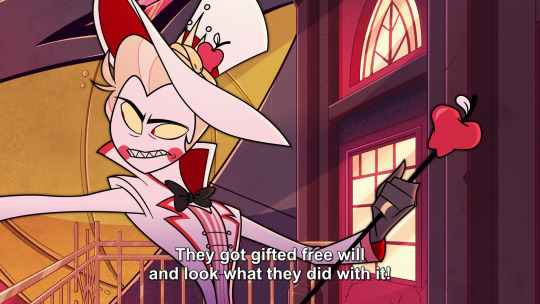
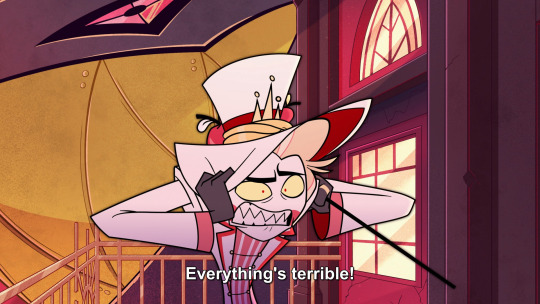
Based on the introduction to Episode 1, Charlie also views 'free will' as a gift (Miltonian), whereas Lucifer appears to view it as a curse:
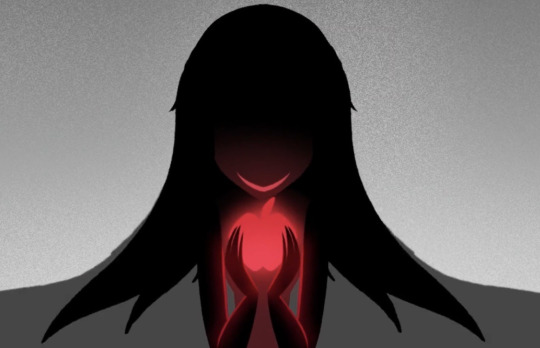
However, Charlie also notes that it was through the 'gift' of free will that the "root of all evil" entered the world, for if mankind could choose to be good, then they could also choose to be evil ('malus').
John Milton states in Paradise Lost: "Of Man's First Disobedience, and the Fruit Of that Forbidden Tree [malus], whose mortal taste Brought Death (evil, malus) into the World, and all our woe."
Thus, the use of an apple specifically is likely a tie-in to what others have been speculating about a character that series creator Vivienne Medrano (Vivziepop) alluded to a while back: "The Root of All Evil".
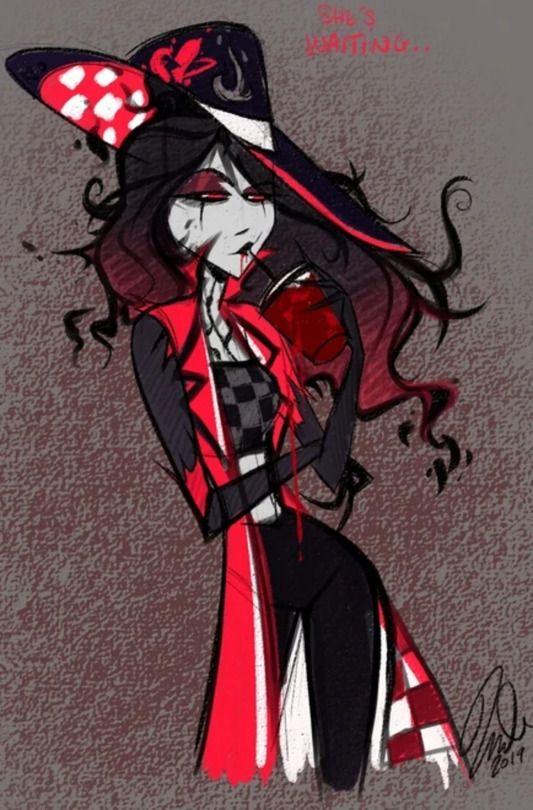
However, "Roo" itself is depicted as possessing the body of a human woman, presumably Eve, the first one to eat the "fruit of knowledge":
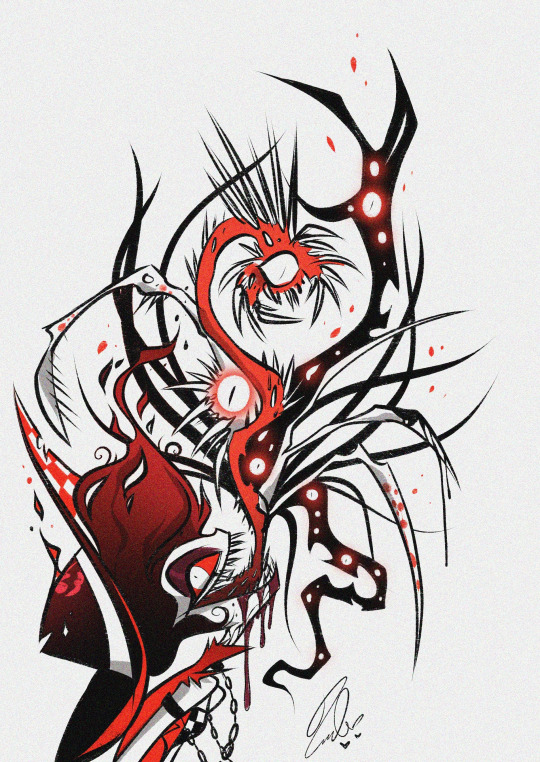
Thus, we can discern that "Malus" likely refers to this character. (Also see: "Maleficent", a name that also uses the root word "mal", "evil".) As for their intentions, if Charlie is "good" - and, if, in fact, Alastor was sent by "Roo" (Eve) - then they may want for Alastor to work on their behalf to "corrupt" Charlie, or make sure the hotel never succeeds.
This is because demonic power is tied to human souls, and there are "millions of souls" in Hell, which likely fuels the great power of "Roo". The more souls there are in Hell, the more powerful "Roo" becomes. The Overlords also get their demonic power from "millions of souls".
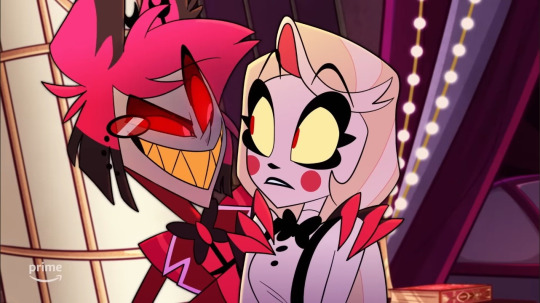
The deal between Eve and "Roo" might even be the first contract, or deal, between a human soul and a demonic entity; in exchange for 'free will', and the knowledge of good and evil, Eve allowed the "Root of All Evil" to inhabit her body, and to escape the void or prison it was confined to by Heaven (Hell?). (For one cannot be 'all-good' unless you attempt to 'eliminate' or 'ablate' evil; and, in Greek mythology, Zeus imprisoned the Titans in Tartarus for all of their evil deeds.)
Another possibility, brought up in an article by Gillian Osborne, is that Lucifer sees the "fruit of knowledge" as an apple, but it may appear as different fruits to different people, depending on how they view it. This also fits with Lucifer and angels being able to easily shapeshift.
In Paradise Lost, only Lucifer describes the fruit as an "apple" (malus), as he associates malus with "bad, evil", while the narrator also describes the fruit as "a mix of different colors" and peach-like. This then begs the question: "Did the fruit of knowledge of good and evil become 'evil' because Eve harbored resentment towards Adam?"
Quote: "Lucifer (Satan) gives Eve yet another hint that this tree may be more complicated than he wishes her to believe: although elsewhere in Milton's poem Eden is heady with its own newness, sprouting spring flowers left and right, the tree of knowledge is already old: its trunk is 'mossie'. Nevertheless, Lucifer claims to wind himself around the tree 'soon'; the quickness of his reported arrival stands in contrast to the timescales required to cover a fruit tree with moss (PL 9.589). Placing Lucifer's winding body between these two timescales—an easeful present and the inhuman scale of natural history—Milton suggests that there is something dangerous in entangling the past with the present. Yet, 'Paradise Lost' also makes deep biblical history feel like present politics for its readers. When Adam and Eve wander out of Eden at the end of the poem, they famously make their way not only into an earthly paradise, but also into the present. Eden's mossy apple tree therefore represents the pitfalls of conflating nature and history, of seeing any action in human history—even Eve's eating of an apple—as natural, if by nature, we mean inevitability. For Milton, history, unlike nature, is directed by humans, progressive, and, like the reading of 'Paradise Lost', hard work. While trees may inevitably collect moss the longer they live, Adam and Eve's labors in the garden, and our labors of reading, require agency and effort. Milton's poem refuses mourning the loss of Eden. [and the perfection of Heaven], in favor of a perpetual, melancholic, recreation of paradise: a present perfecting."
To quote Twisted: The Untold Story of a Royal Vizier, which also draws inspiration from John Milton's Paradise Lost: "It's an unfortunate situation...but you do have a choice [i.e. free will]."
260 notes
·
View notes
Text
ok so penacony is basically space vegas lmaoo
2 notes
·
View notes
Text
If hell is forever than heaven must be a lie
yk i gotta say I’m grateful for what this show is trying to say about the Christian narrative regarding heaven and hell, salvation, damnation, and its underlying hypocrisy.
like…(sorry rant coming) i spoke to my dad today, (who is a priest). And something really awful happened at my work place yesterday that I can’t even say online because of potential legal ramifications.
But even though we don’t talk much, I was missing my dad and told him what happened. And what did I get?
A 30 minute lecture on why I need God in my life 😑
And in the midst of debating, I thought about this show and how it was all so clear - Hazbin’s message that the rules of who gets saved and who gets eternal damnation are arbitrary and ridiculous because they’re made up.
But for Christians like my dad, they don’t understand that the absoluteness of Christian and religious faith is flawed. You can only believe and practice is this one specific way and if you don’t, you’ve rejected God and therefore he rejects you.
So I’m glad that shows like this exist, that are rewriting these stories and teaching us what it really means to love, have empathy, and be human.
28 notes
·
View notes
Text
i kinda hope that whatever caused distance between charlie and lucifer hasn’t been completely resolved. like i want to understand what happened and see Lucifer’s depression get in the way of trying to connect and Charlie struggling to trust her Dad because issues from an absent parent doesn’t magically go away. i think it’d be better development-wise.
42 notes
·
View notes
Text
i love that they gave lucifer the angel glow in the finale.

my boy was like this

#church kids know what i’m talking about#hazbin lucifer#lucifer#lucifer morningstar#hasbin hotel#hazbin hotel#touched by an angel#who else’s parent forced them to watch this show 🙋♀️#i’m not a christian anymore but touched by angel still makes me cry
124 notes
·
View notes
Text
Lucifer didn't sleep with Eve lmao
I had to make this post to make it clear because I've seen a few ppl say the same thing. When Lucifer said "Well your first wife didn't seem to hate what I had to offer" he was clearly talking about Lilith and the fact that they married later, then he says "or the second" implying that he gave her something too. its a play on words because he did give both of them something but what he gave was completely different! for Lilith he gave himself and for Eve he gave the apple! so both of them did like what he had to offer, but it's important to remember what the offer actually was! that's why ep 1 takes the time to explain what happened between the 4 of them. the "bow chika wow wow" was just Lucifer being a little shit to piss Adam off because he doesn't like him and he's rubbing it in Adams face that both his brides chose something he had over Adam. so no they didn't sleep together, viv and the team are just super slick with their jokes lol
899 notes
·
View notes
Text
hmmm it seems like lucifer has some obsessive tendencies tied to his pride and perfectionism. in the song with him and charlie, the line “the tales about your lofty dreams” are sung over him conjuring up a duck.
We know that Lucifer was kicked out for his ideas, and based on that scene, we could infer that he had some idea for a duck that was rejected by the angels and heaven.
Which is why we see his room full of rubber ducks. He could never get over his wounded ego and has been obsessively trying to make the “perfect” rubber duck, despite pushing his family away. Maybe this is why Lilith left him.
At least that’s my theory.
23 notes
·
View notes
Text
just sitting here thinking how we really watched johanna die this season 💀
1 note
·
View note
Text
i started rewatching blue exorcist since the new season came out and i have near zero recollection of this show. not a single episode was familiar
i’m questioning if i ever even watched it 😭 even though i know i did
9 notes
·
View notes
Text
i think it's so funny when queer creators have het ships in their work that are way better than most cishet writers can come up with






1K notes
·
View notes
Text
poor johanna bro 😭 she has some deep abandonment wounds, from her parents, anders and even astrid after she moved away - that’s why her kid self was so distrusting
21 notes
·
View notes
Text
Older brothers who become a parent to their younger siblings is quickly turning into my favorite flavor of man


#anime#the yuzuki family's four sons#a galaxy next door#Ichiro Kuga#Yuzuki Hayato#Slice of life#anime crush
27 notes
·
View notes
Text
i’m dying to know what anime logic they use to make bakugou come back from the dead, and have the ability to even stand right now lol
#i’m so happy he’s alive but ik the circumstances are about to be ridiculous 😭#bnha spoilers#mha#my hero academia#bakugou katsuki#spoiler#spoilers#anime logic
12 notes
·
View notes
Text

what's up birdwatchers? now that my adventures with superman is on hiatus, i thought i'd use my powers of Being A Very Big Nerd to get you started reading comics! with 80 years of material it can feel kind of intimidating to get into, but the best way to do it is just dive in and follow your curiosity from there
i've structured these recs around our friends in the daily planet newspaper morgue. any superman story is going to have his girlfriend and his pal there to support him, but i've also made sure to throw in some solo stuff for lois and jimmy so they get a chance to shine too
Clark Kent/Kal-El/Superman
Superman Smashes the Klan (2019) - written by Gene Luen Yang, with art by Gurihiru
a sweet little graphic novel based on a 1946 radio serial with a badass real life story behind it. makes me cry. i yell at everyone to read this whether they're superman fans or not. also they weren't lying superman really does smash absolute klan AND punches a nazi
i also encourage everyone to read the historical backstory at the end of the comic. it does a good job laying out superman's jewish origins and tells a pretty dope story about the time he fought the kkk in real life
Superman for All Seasons (1998) - written by Jeph Loeb with art by Tim Sale
a fairly classic take on a young superman. the tone is pitch perfect and tim sale's character designs are to die for
Superman: American Alien (2015) - written by Max Landis with various artists
so this is a weird baby superman story tone and characterization-wise and i'm going to advocate pirating this bc max landis is a sex creep, but it's so much fun i'm still going to recommend it. it's a good mix of serious pathos from clark's childhood and absolutely iconic shenanigans as he moves into young adulthood
Lois Lane
Lois Lane: Enemy of the People (2019) - written by Greg Rucka with art by Mike Perkins
first time comic readers are going to need to keep an open mind when random in-continuity crossover stuff cuts into the plot, but learning to roll with that stuff for the sake of a good story is part of getting into the medium! and it's so, so worth it to see lois on a solo adventure surrounded by lesbians with clark only popping in from time to time for moral support. there's a subplot about how the public thinks lois is cheating on clark kent with superman bc they can't keep their hands off each other in public. she fights ICE. it's amazing
Superman: Lois Lane #1 "Nostalgia" (2014) - written by Marguerite Bennett with art by various artists
a version of lois's relationship with her family that i'm particularly fond of. it goes into her childhood with lucy, the loss of her mother, and the way that impacts them both as adults
Jimmy Olsen
Superman's Pal Jimmy Olsen: "Who Killed Superman's Pal Jimmy Olsen?" (2019) - written by Matt Fraction with art by Steve Lieber
what you need to understand about jimmy olsen is his solo shit from time immemorial has been really, really weird. just perpetually weird. remember what i said earlier about new comics readers needing to learn to roll with random stuff they don't understand for the sake of a good story? this is a good story that is nothing but random stuff you have to roll with. this has been the nature of superman's pal jimmy olsen since the silver age. it's a great time tho fr
Superman #158 (1962) - written by Edmund Hamilton with art by Curt Swan
some old school silver age hijinks that have lived on through all kinds of reboots and retcons over the years. this is the origin of nightwing (best known as dick grayson's mantle post-robin) and of course our beloved flamebird. it's just fun and i think it's important for everyone to know jimmy was the first flamebird
extra credit
Supergirl: Woman of Tomorrow (2021) - written by Tom King with art by Bilquis Everly
you haven't met kara zor-el yet, but a voice actor HAS been cast for her so you definitely will. kara zor-el is kal-el's cousin who was 14 years old when krypton was destroyed. when she was sent away, she was supposed to find her baby cousin on earth and take care of him, but her ship was caught in the phantom zone and she was left in stasis until he was grown. she remembers everything that was a mystery to him, and this story in particular does a gorgeous job exploring that. it's one of my favorite comics ever written
Action Comics #1-10 (1938-9) - written by Jerry Siegel with art by Joe Shuster
the og! i'm tossing these in here because they're genuinely a really fun read. the closer you get to world war ii the more they dip into old-timey yellow peril racism, so content warning for that (although i don't remember if that's in the first ten issues tbh), but they're genuinely a fun read and some of the politics are surprisingly radical even for today
where to find this stuff
your local comic book shop does of course sell comics, and they'll even order stuff for you if they don't have it in stock. if your library has hoopla, you can likely borrow most of these comics digitally and for free (and of course you can check your library's physical collection as well)
if those don't work, well... i'm not gonna blow up my spot but if you install a good adblocker (ublock origin is my fave), fire up duckduckgo, and search "[comic title + issue number (if applicable)] read comic online" then that should get you where you need to go. happy reading!
532 notes
·
View notes
Text
Prediction for Season Finale
I wonder if the season is going to end with Clark running away. Our boy has been going through it, lately. Totally in the dark about his origins, tortured and pursued by Task Force X, believing he’s a weapon and afraid of what he’s capable of. Considering this new promo, and the overall trust issues that Clark, Lois, and Jimmy have dealt with, I think him seeing his evil self, them hiding this information, General Lane being at Thanksgiving (i think I heard this somewhere idk if it’s true) and almost dying from Kryptonite will be the thing that pushes him away. And ultimately find/ create his Fortress of Solitude.
For new Superman fans, The Fortress of Solitude is the place where Superman learns about his Kryptonian heritage and speaks to his father Jor-El. I think in the Christopher Reeves movie (and many other adaptions of Superman) he spends many months in his fortress, learning who he is and how to use his powers before returning to the world as Superman.
I think this is what Clark needs ultimately. He needs answers about who he is. Who his people were, and what Zero Day really was. MAWS has been putting their own spin on these classic bits of lore, so who’s to say what they’ll do with the Krypton but I’m putting money down on some sort of pilgrimage or maybe even some revelation with Jor-el’s hologram.
32 notes
·
View notes
Text
is seems like the general knows that superman is vulnerable under red sun light based on the promo so i’m curious how much he knows about krptonians.
27 notes
·
View notes
Text
so everyone is fighting over whether Lois is justified in being upset or not.
but…personally I’m focusing on how the writers spoon fed us their adorable relationship from the get go, then sadisticly ripped it away. You deviant bastards, you.

but joke’s aside, it’s quite refreshing how they’re subverting the classic clark and lois dynamic. So It will be interesting to see how they rebuild from that.
Also, I’m really hoping Lois’s memory doesn’t get erased (looking at you Superman 2).
96 notes
·
View notes